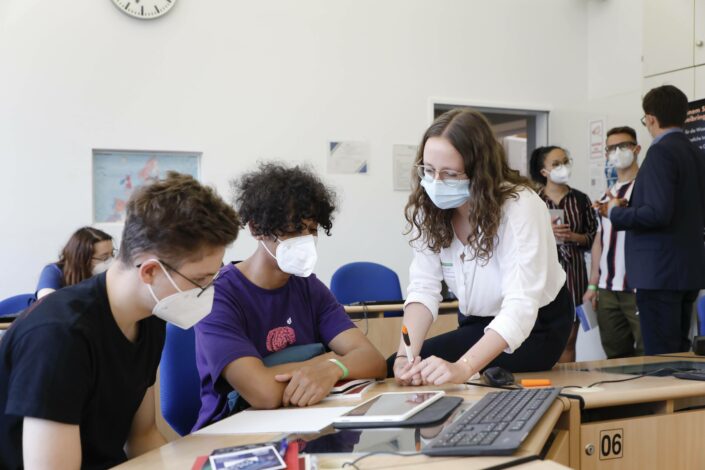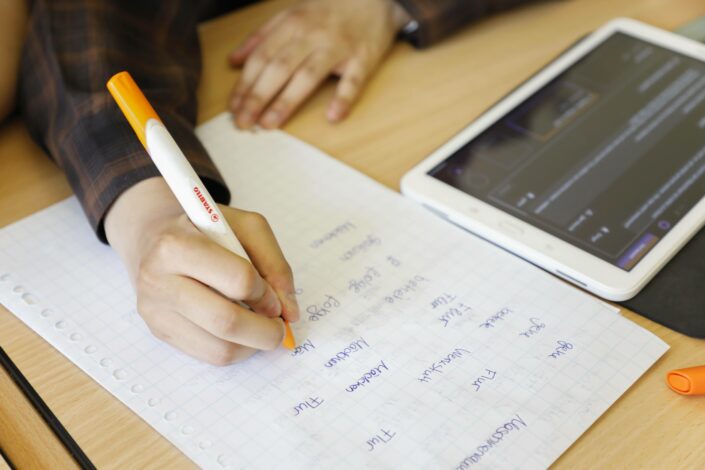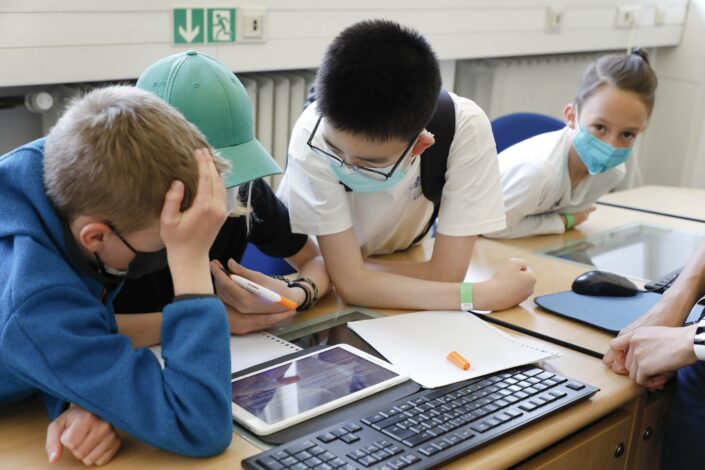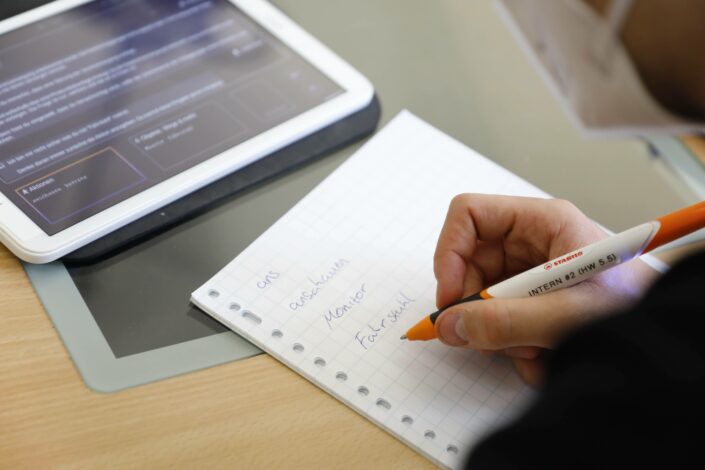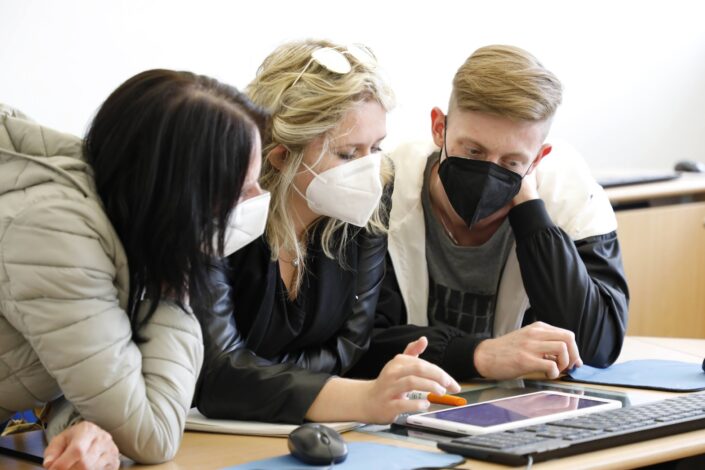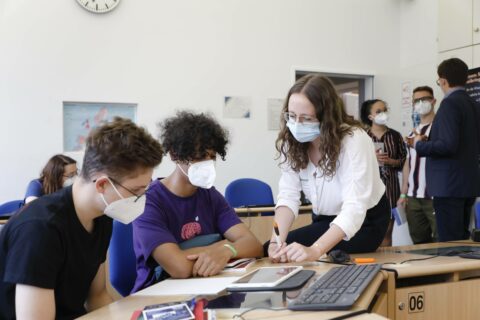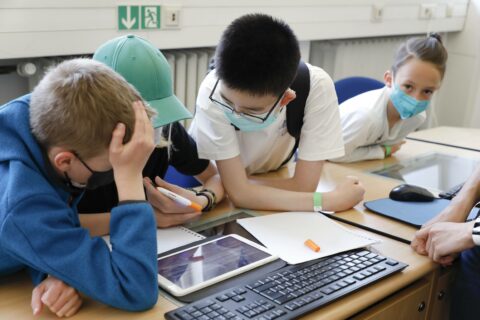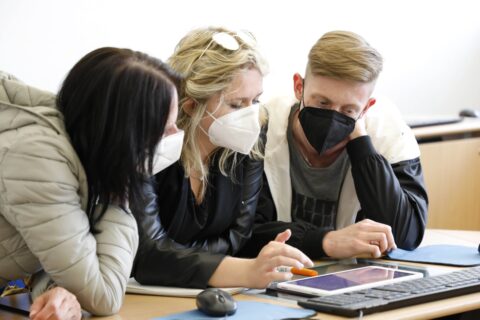Index
Project Seminar: Understanding and Designing the Metaverse (MA)


Since the science-fiction author Neal Stephenson coined the term “metaverse” in his novel Snow Crash, a portmanteau of “meta” (Greek for beyond) and “universe”, people have been dreaming of realizing his vision of a virtual reality-based three-dimensional (3D) successor to the Internet, in which people interact with each other, virtual agents and objects in the form of avatars. This virtual universe is envisioned to exist in parallel to reality, has its own economy, culture, organizations, rules, and laws, and, similar to the Internet, is considered to be an open, distributed, and collectively created space where anyone can become a content creator and can shape this collectively created virtual world.
Driven by recent cultural and societal developments − such as the increasing popularity of digital games and the acceptance of remote collaboration − as well as technological advances − such as AR and VR, 5G, blockchain technologies, cloud computing, streaming technologies, or artificial intelligence − various big technology companies have started developing platforms from which a potential metaverse could emerge soon. Metaverse-like platforms such as Roblox, Fortnite Creative, The Sandbox, VR Chat, Meta Horizon Worlds, and Minecraft are already attracting millions of users to design and jointly experience virtual worlds.
This seminar aims to understand how the metaverse may shape the future of research, education, business, healthcare, and society as well as what current and future challenges the topic entails. In this seminar, students explore the ongoing scientific discourse on the topic and strive to understand what socio-technological trends may support the further development of the metaverse. To this end, the students create immersive 3D content on popular and emerging metaverse-like platforms and investigate relevant research questions related to the topic in empirical studies. The seminar is positioned at the intersection of Information Systems and Human-Computer Interaction and strives to create knowledge by implementing and evaluating prototypes, interactive experiments, and case studies.
This project seminar applies a research-based learning approach, in which students learn how to read and understand scientific papers, develop, and evaluate hypotheses by using scientific methods, and think critically and creatively. Students learn how to solve scientific problems, challenges, and dilemmas. Further, the course trains skills for communicating in the field of science through writing and discussion and thus prepares writing a master thesis.
Prerequisites
Profound English skills are required. Further, creativity, experience in software design, user experience, prototyping, and software engineering are very helpful.
All participating students should be motivated to work in an international and interdisciplinary group on a challenging topic.
In-depth game design knowledge, e.g. from participation in the course Designing Gamified Systems, is helpful and recommended.
Most of our projects require knowledge of software development. Willingnes to code is a prerequisite to participate in this course.
Topics
In the winter semester of 2024, we will be offering topics related to:
– INFLAMMANIA 3D – The Inflammation World: Several topics related to how we could use Roblox games as a media in medical education and science communication (see: https://gamification.rw.fau.eu/courses/student-projects/inflammania-3d/)
– PRIME – Privacy in the Metaverse (see: https://gamification.rw.fau.eu/research-gamification-and-digital-customer-engagement/research-projects/)
– Industrial Metaverse – Understanding the potential of the metaverse to increase situational awareness in dynamic decisions
– Metaverse meets Healthcare – Designing and understanding solutions for including the virtual self in transformative healthcare
Method of examination
Seminar paper and presentation
Lecturers
Prof. Dr. Benedikt Morschheuser
Tutors
Runjie Xie & Jonathan Stief (Roblox development)
Course details
Block lectures + Group work + Seminar Project
ECTS-Credits: 5 as team project, 10 as individual project (by arrangement)
Dates
Announced in StudOn and Campo
Registration
Via the official IIS seminar registration process.
Link to StudOn: https://www.studon.fau.de/crs5986405_join.html
Seats are limited.
Additional information
More details on the seminar, materials, technical requirements, and other information will be announced in StudOn.
Keywords: Metaverse, Interactive Information Systems, HCI, Web3, Virtual Reality, Augmented Reality, Mixed Reality, Gamification, Games
Designing a text-based adventure game to train an AI in reading handwriting
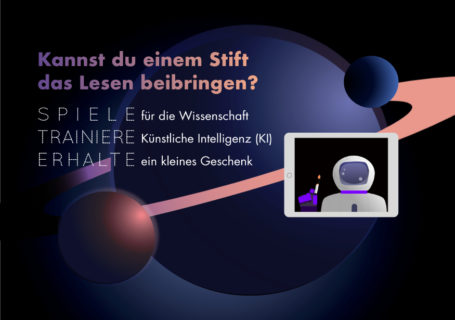

In collaboration with STABILO International GmbH, we developed a text-based adventure for the STABILO DigiPen. STABILO Dungeon is a gamified crowdsourcing approach that aims to engage people in writing words with the IoT device Digipen, a classic ballpoint pen equipped with sensors to detect movement and pressure of a person’s handwriting. The aim of this project is to collect handwriting data for further developing the Digipen’s machine learning algorithms.
The core game mechanism of STABILO Dungeon is primarily driven by a narrative: At predefined points in the game, the player controlling the protagonist can decide the story’s progression by writing down an actionable activity on standard paper. The possible activities are a set of pre-defined actions in the game, which makes it easy for the DigiPen to recognise the handwritten word and thus to further train the handwriting recognition.
While the benefits and potential of gamification have been consistently demonstrated in various research, it is crucial to acknowledge that gamification approaches are not always effective and vary in their success, possibly because standard gamification concepts such as one-size-fits-all (OSFA) approaches commonly lack the consideration of the diversity of users. However, with adaptive gamification, this issue can be addressed by adapting the system to the individual user’s preferences.
Between January and May 2022, the experiment was presented on two consecutive weekends at JOSEPHS, an open-innovation laboratory in the city-centre of Nuremberg, as well as at the “Long Night of the Sciences” in Nuremberg. In total, the study resulted in a collection of 8,563 crowdsourced handwritten words. 135 participants completed the experiment by playing the game as well as filling out two questionnaires which measured the players’ enjoyment and intention for future play, amongst others.
The public-service radio and television broadcaster Bayerischer Rundfunk released a short video in German showcasing the experiment as well as the DigiPen as part of the Frankenschau at 28.02.2022.
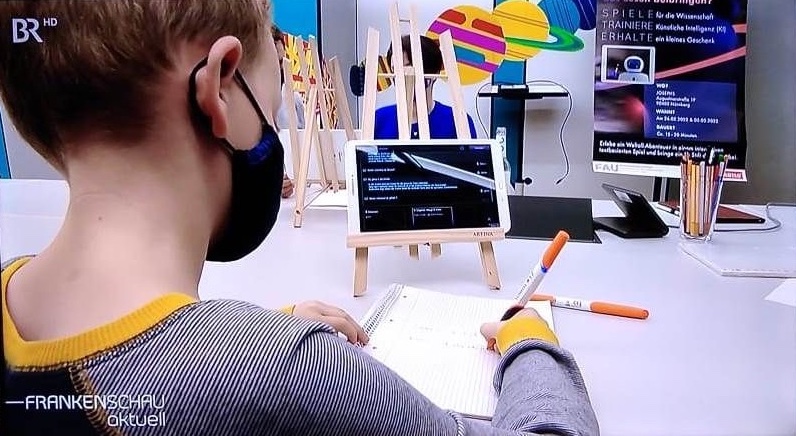
For more details, see: https://www.br.de/mediathek/video/erste-testlaeufe-intelligenter-stift-digitalisiert-handschrift-av:621d14290b569700085cde93
We thank Jens Barth, Tim Hamann and Peter Kaempf of STABILO International GmbH for the exciting collaboration.
The study was presented as a conference paper at the Hawaii International Conference on System Sciences 2023 in January 2023. Please see the paper for full details:
CUBEness
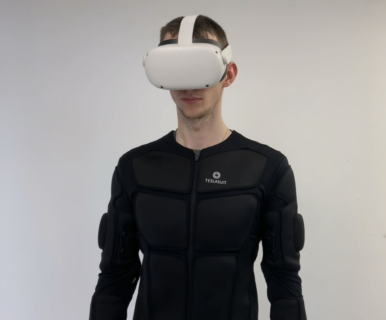
Challenge: In recent years, exploring space has become a trending topic again. Various private organizations such as SpaceX, Blue Origin, or Virgin Galactic and government organizations from the USA, China, India, Europe, or Russia compete for supremacy in space. Besides the exploration of new dimensions, this trend paths the way for innovations that will also change our life on earth. For example, an increasing number of satellites orbiting our earth, offer new possibilities for earth observation and high-speed internet anywhere on earth. This offers new challenges and opportunities, which can be tackled with approaches from game design and gamification. Thus, the task of this semester’s course on Designing Gamified Systems was to:
Design an innovative game or gamification approach in which gaming, space technology and mobility meets in order to either A) improving life on earth or B) improving life in space.
Date: Winter semester 2021
Lecture: Designing Gamified Systems
Result:
CUBEness
Team: Heschu Qarani, Jonathan Stief, Sherwet Galal, Cem Karatasan, Gerrit Sußner
Abstract:
The interest in space is constantly increasing: From space agencies planning longer projects, such as NASAs’ Artemis mission, to private companies such as SpaceX planning to put humans on Mars. Overall, the private sector of space tourism is projected to reach a total of US$1.7 Billion by 2027. The market will expand much further in the future, with long-term missions becoming increasingly frequent.
Yet these long-term missions pose significant strains on both the human body and the mind. First among them is the deterioration of muscles, muscle atrophy, and the cardiovascular system through microgravity. These effects are so severe that even short missions (< 30 days) can cause a muscle volume loss of 5.5 to 15.9 percent. In order to combat these effects, most space agencies employ in-flight exercises of about 2.5 hours six days a week. Secondly, space missions represent the “perfect boring situation” and can invoke mental health issues.
Our VR solution addresses both aspects equally, as it gamifies the required exercise to avoid physical consequences, as well as challenge the players mentally and provides opportunities for experiencing social relatedness. For this, it uses both state-of-the-art VR equipment, as well as a Teslasuit, to not only make the experience feel even more immersive through haptic feedback, as well as the possibility to enhance training effects. The main game consists of resource collection during the exercise and a base-building type game in the phases between workouts. Both take place in VR.
In order to overcome the dullness of the monotonous environment, the game features a story putting the players in a scenario in 2075, where Mars has been colonized, and it is now their shared mission to defend and extend the colony. However, players need to collect resources through exercise to repair and build further modules, which is conducted within the VR game.
In the story mode, they are guided through their exercise by story-related messages, collecting resources while traversing the base and the landscapes of Mars. As voluntariness represents an important point in the acceptance of gamified approaches, however, players also have the option to avoid the story. While exercising, they collect resources by swiping them to the side with their controller. From the collected resources they then have the possibility to build three different types of buildings: (1) shelter domes, which set the defense for the whole colony, (2) windmills, which produce electricity for the colony, (3) greenhouses, which produce oxygen. To increase complexity, create fun, and challenge players mentally, the electricity and oxygen stats must match the shelter, or the colony will be dysfunctional, and the defense will receive a debuff. Players will have to ready their bases for increasingly difficult challenges, such as further alien attacks, sand storms, and similar difficulties that life on Mars would bring. This aims to create a long-time engagement in the player, relying on the immersion and social interaction between the crewmates of the space mission to defend their shared colony.
We use a Teslasuit, a smart textile two-piece full bodysuit, to make the experience immersive and interactive. The suit provides haptic feedback, captures motion and biometric functions. Further, a full-body haptic feedback system is built into the suit with 80 electrostimulation channels, which could be used to provide instant feedback on the players’ performance within the game. It can be functionalized in response to motion capture comparison at any time. No additional equipment will be need. The approach may be used with existing training equipment in space stations such as the ISS.
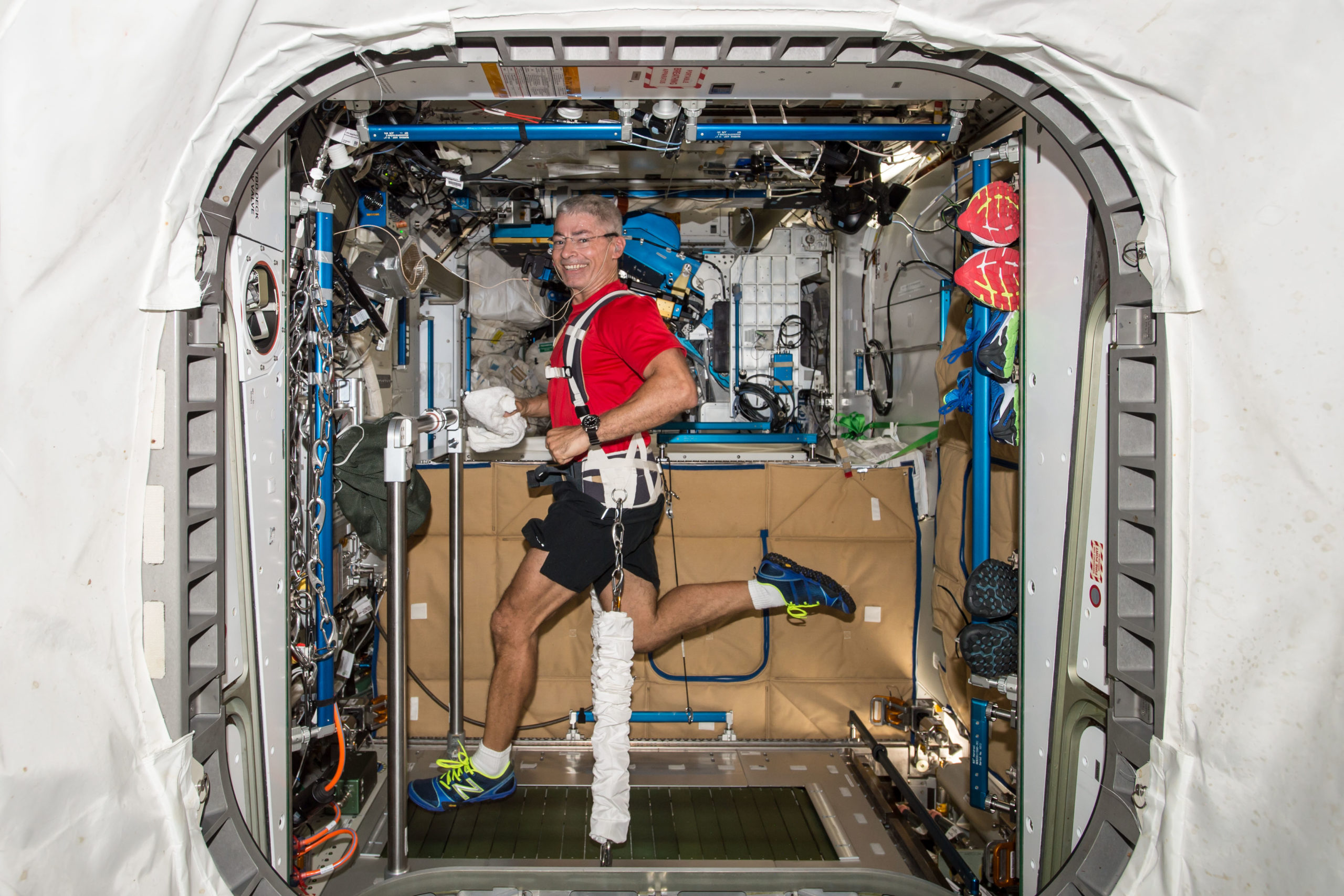
reHAND
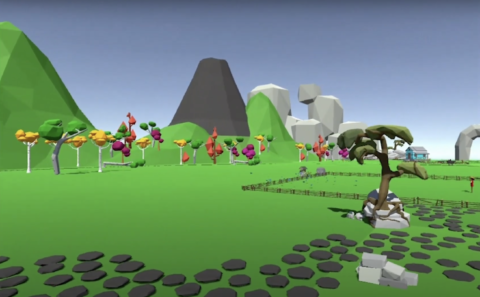
Challenge: The use of digital technologies in rehabilitation processes is constantly increasing. In particular, studies show the advantages of telemedical assistance systems in rehabilitation and aftercare. Such cyber rehabilitation can support patients individually and at home. The aim of the project is to develop an gamified solution for assisting and motivating patients in hand rehabilitation.
Automate rehabilitation procedures with gameful simulations and make it accessible (at home)
Date: Winter semester 2021/2022
Lecture: Exergames
Result:
reHAND − Cyber Rehabilitation for hand injuries
Team: D. Braun, E. Alekseenko, V. Rincon, A. Patoary
Abstract: The human hands have a complex structure. Hand injuries, therefore, have a significant negative impact on multiple life aspects. This project presents a Virtual Reality (VR) Exergame to help medical practitioners receive information on improvement rates and make exercising more attractive to patients. The game has been developed in Unity 3D game engine for the HTC VIVE Focus 3. The reHAND system performs an error calculation of the user’s hand movements and then provides feedback on the accuracy with which a user can perform an exercise. While playing, a user should protect their garden from the angry jealous neighbor, who throws trash in it. Accordingly, the patient performs certain hand movements to break thrown objects. Further, reHAND covers such motivational affordances as points (intrinsic game score), levels, and storytelling.
GitLab Repository: https://gitos.rrze.fau.de/hex-teaching-2021/exergames/exergames-group-3
Designing Gamified Systems (MA)


Driven by the rising popularity of digital games, technology, business, and society are increasingly influenced and penetrated by games and trends of the gaming industry. One of the probably most important phenomena of this multi-faceted development is “gamification”, which refers to the use of design principles and features from games in the design of information systems, processes, and services.
Gamification’s popularity stems from the notion that games are a pinnacle form of hedonic information systems and thus are particularly effective in invoking intrinsic motivation and experiences such as autonomy, mastery, flow, immersion, relatedness, and overall enjoyment. Across industries, marketers, designers, and developers are thus using gamification as a design approach when engineering digital products and services with the purpose of inducing gameful experiences, influencing human motivation, and even change behavior in various contexts.
This course:
- teaches the key concepts, design patterns, and approaches of motivational, hedonic (i.e., games and video games), social and gamified information systems.
- offers deep insights into advanced concepts and theoretical foundations of game design, motivational psychology, and information system design.
- introduces methods and frameworks for designing gamified systems and managing gamification projects.
- discusses latest research findings and the potential impact of gamification on society, economy, and everyday life.
Course Overview
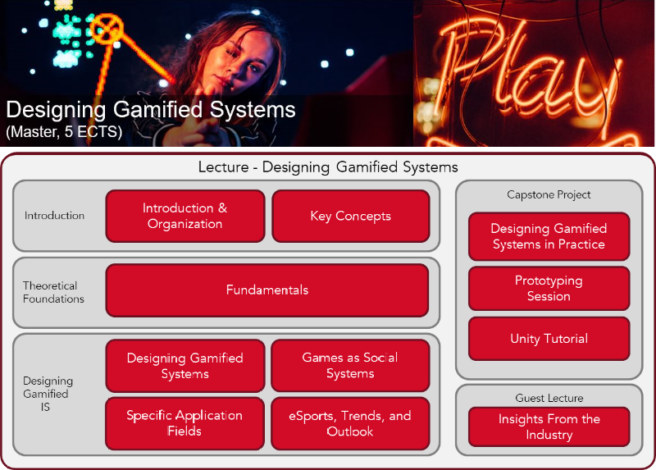
Capstone Project
The course is complemented with a practical design project in which students in a team select and apply design methods as well as techniques in order to create a prototype of a gamified or hedonic information system. Within this project, the students can apply knowledge and skills acquired in this lecture and their studies in a challenging context.
EELISA
This course is offered as part of the European Engineering Learning Innovation and Science Alliance (EELISA – https://eelisa.eu) to give the lecture an even more international setting and allow FAU students to collaborate in their projects with interdisciplinary students from all over Europe.
Learning Objectives and Skills
The students gain knowledge in understanding the underlying design principles of gamified and hedonic information systems and can analyze and discuss such systems. The students learn state-of-the-art methods, techniques, and tools for successfully conducting gamification projects and can select and apply them. The students can train their creativity, their prototyping skills as well as improve their collaboration and presentation skills.
Tutorials
The sessions are accompanied by tutorials where students learn the basics of developing games in Unity3D, as well as discuss current challenges in the implementation of their projects.
Prerequisites
Profound English skills are required. Further, creativity, experience in software design, user experience, prototyping, and software engineering are helpful. All participating students should be motivated to work in an international and interdisciplinary group on a challenging topic.
Lecturers
Prof. Dr. Benedikt Morschheuser
Tutors
Sandra Birnstiel (Unity3D and programming support)
Dr. Jeanine Kirchner-Krath (Advice on psychological theories and study design)
Partners and guest lecturers in summer semester 2024:
Project partners:
Dr. Jens Barth − Head of Software Solutions at STABILO International GmbH
Dr. Christine Anstätt − Senior Manager Innovation Projects at adidas AG
Pascal K. Whiba − Entrepreneur Digital Health (Exergaming.org)
Ralf Nickel − Schön Klinik, München
Dr. Kathrin Fuhrmann − Head of the Green Office at FAU
Guest lecturers:
Georgina Guillén-Hanson − Researcher on Gamifying Sustainable Consumption (Gamification Group Finland)
Daniel Fernández Galeote − Game Designer and Researcher on Gamifying Sustainable Consumption (Gamification Group Finland)
Dr. Velvet Spors − Researcher on Gamification of Mental Health (Gamification Group Finland)
 |
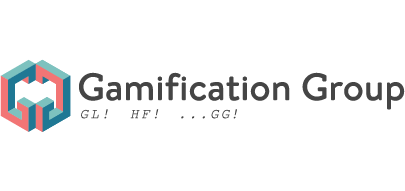 |
 |
 |
Course details
Lecture + Capstone Project, 4 SWS, ECTS-Credits: 5
Dates
Thursday, 09:45-13:00, LG 0.424
Module compatibility
WF IIS-MA 1 (ECTS-Credits: 5)
WF IIS-MA 2 (ECTS-Credits: 5)
WF IIS-MA 3 (ECTS-Credits: 5)
WF IIS-MA 4 (ECTS-Credits: 5)
WF WING-MA from 1 (ECTS-Credits: 5)
WF ICT-MA from 1 (ECTS-Credits: 5)
WF EEI-MA from 1 (ECTS-Credits: 5)
ECTS
Credits: 5
Registration
Starts on 2024 February 25, 14:00 via StudOn.
Additional information
More details on course updates, materials, technical requirements, and other information will be announced in StudOn.
Keywords: Gamification, Interactive Information Systems, HCI, Customer Engagement, Social Computing, Hedonic Systems, Games
Inspiration of previous semesters
Summer semester 2023
Capstone project topics:
- Design a strategy game in which the players take over the role of the immune system, make strategic decisions in order to win and learn more about the role of the protein IL-33 and how the immune system is using inflammations to eliminate attackers (for instance, bacteria) and set repair mechanisms in motion.
- Design a cooperative gameful simulation in Roblox in which the players take over the role of the immune system of a patient with Systemic Lupus Erythematosus (SLE) in the novel and revolutionary CAR T-cell therapy developed as part of this FAU research project
- Design a gamification approach that engages patients with lung diseases (e.g. Asthma or chronic obstructive pulmonary disease COPD) to participate in an app-based breath training for 20 days by using gamification elements to invoke competence satisfaction and an unique “game feel”.
- Design a gamification approach that engages patients with lung diseases (e.g. Asthma or chronic obstructive pulmonary disease COPD) to participate in an app-based breath training for at least 20 days by using a theme or narratives as a core games mechanic.
Focus:
Gamification, Heath, Science Communication, Games
Partners and guest lecturers:
Baturay Yalvac − COO (Breathment)
Sandra Jeleazcov − CEO SFB1181 (University Hospital Erlangen)
Georgina Guillén-Hanson − Researcher on Gamifying Sustainable Consumption (Gamification Group Finland)
Daniel Fernández Galeote − Game Designer and Researcher on Gamifying Sustainable Consumption (Gamification Group Finland)
Dr. Velvet Spors − Researcher on Gamification of Mental Health (Gamification Group Finland)
 |
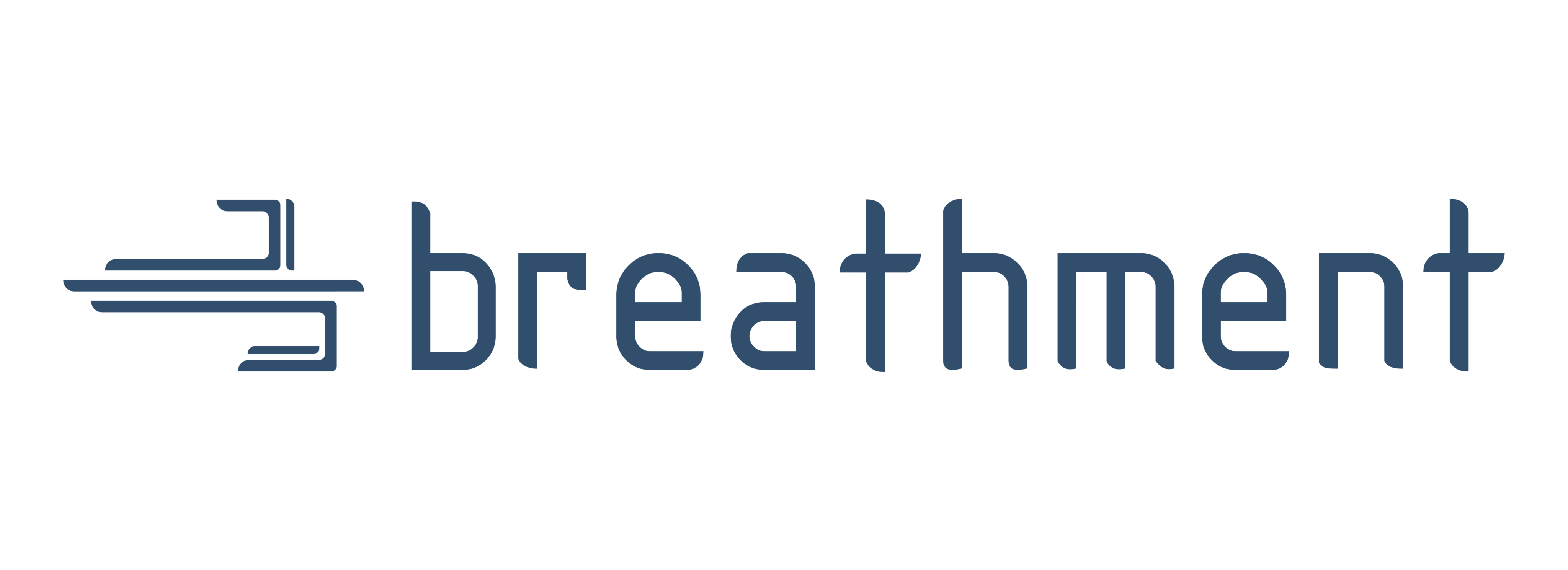 |
 |
Summer semester 2022
Capstone project topic:
Design and investigate a novel digital gamification solution for your favorite team sports in order to increase the athlete’s training experience and the social dynamics within teams.
Focus:
Gamification, Team sports, Collaboration, Training, Augmented Reality, Health
Partners and guest lecturers:
Burkhard Dümler − Director Program & Projects IT Innovation (adidas AG)
Georgina Guillén-Hanson − Researcher on Gamifying Sustainable Consumption (Gamification Group Finland)
Daniel Fernández Galeote − Game Designer and Researcher on Gamifying Sustainable Consumption (Gamification Group Finland)
 |
Winter semester 2021/2022
Capstone project topic:
Design of an innovative game or gamification approach at the intersection of gaming, mobility and space technology, which improve life on earth or travel in space.
Focus:
Gamification, Crowdsourcing, Satellite Techonology, Mobility, Augmented Reality
Event:
Billionaires start space tourism
Guest lecturers:
Alexander Satanowsky − Head of in-Car Gaming (Mercedes-Benz AG)
Georgina Guillén-Hanson − Researcher on Gamifying Sustainable Consumption (Gamification Group Finland)
Daniel Fernández Galeote − Game Designer and Researcher on Gamifying Sustainable Consumption (Gamification Group Finland)
Dr. Michael Reinhardt − Head of OpenIT Studio (Siemens Healthineers)
Nicolas Butterwegge − IT Strategy Manager (Siemens Healthineers)
 |
Summer semester 2021
Capstone project challenge:
Design of an innovative game or gamification approach in which sports, gaming, and mobility meet as part of an unforgettable mixed-reality experience for potential visitors of the 2022 Olympic Asian Games in China, Hangzhou.
Focus:
eSports, Sports, Augmented Reality, Mobility, Gamification
Event:
Asian games announced to have eSports as official discipline
Guest lecturers:
Alexander Satanowsky − Head of In-Car Gaming (Mercedes-Benz AG)
Georgina Guillén-Hanson − Researcher on Gamifying Sustainable Consumption (Gamification Group Finland)
Daniel Fernández Galeote − Game Designer and Researcher on Gamifying Sustainable Consumption (Gamification Group Finland)
 |
Publications

Peer-reviewed publications
Journal Articles
- , , , , , :
Behavior Change Support Systems for Self-Treating Procrastination: Systematic Search in App Stores and Analysis of Motivational Design Archetypes
In: Journal of Medical Internet Research 27 (2025), Article No.: e65214
ISSN: 1438-8871
DOI: 10.2196/65214 - , , , :
Gameful systems for corporate sustainability: systematic review, conceptual framework and research agenda on gamification and sustainable employee behavior in companies
In: Internet Research (2024)
ISSN: 1066-2243
DOI: 10.1108/INTR-06-2024-1000
URL: https://www.emerald.com/insight/content/doi/10.1108/intr-06-2024-1000 - , , , , , , , , :
Uncovering the theoretical basis of user types: An empirical analysis and critical discussion of user typologies in research on tailored gameful design
In: International Journal of Human-Computer Studies 190 (2024), Article No.: 103314
ISSN: 1071-5819
DOI: 10.1016/j.ijhcs.2024.103314
URL: https://www.sciencedirect.com/science/article/pii/S1071581924000983 - , , :
Proteus effect or bodily affordance? The influence of virtual high-heels on gait behavior
In: Virtual Reality 28 (2024), p. 1-19
ISSN: 1359-4338
DOI: 10.1007/s10055-024-00966-5
URL: https://link.springer.com/article/10.1007/s10055-024-00966-5 - , , , , , :
Challenges in the adoption of sustainability information systems: A study on green IS in organizations
In: International Journal of Information Management (2024), Article No.: 102754
ISSN: 0268-4012
DOI: 10.1016/j.ijinfomgt.2024.102754
URL: https://www.sciencedirect.com/science/article/pii/S0268401224000021 - , , , :
Altruism or egoism – How do game features motivate cooperation? An investigation into user we-intention and I-intention
In: Behaviour & Information Technology (2023)
ISSN: 0144-929X
DOI: 10.1080/0144929X.2023.2196581 - , , , :
Gamification of cooperation: A framework, literature review and future research agenda
In: International Journal of Information Management 67 (2022)
ISSN: 0268-4012
DOI: 10.1016/j.ijinfomgt.2022.102549 - , , :
Is it a tool or a toy? How user’s conception of a system’s purpose affects their experience and use
In: International Journal of Information Management 49 (2019), p. 461−474
ISSN: 0268-4012
DOI: 10.1016/j.ijinfomgt.2019.07.016
URL: https://urn.fi/URN:NBN:fi:tuni-202011167971 - , , :
Cooperation or competition – When do people contribute more? A field experiment on gamification of crowdsourcing
In: International Journal of Human-Computer Studies 127 (2019), p. 7−24
ISSN: 1071-5819
DOI: 10.1016/j.ijhcs.2018.10.001
URL: https://urn.fi/URN:NBN:fi:tuni-202011167972 - , :
The gamification of work: Lessons from crowdsourcing
In: Journal of Management Inquiry 28 (2019), p. 145−148
ISSN: 1056-4926
DOI: 10.1177/1056492618790921
URL: https://urn.fi/URN:NBN:fi:tuni-201911216163 - , , , :
How to design gamification? A method for engineering gamified software
In: Information and Software Technology 95 (2018), p. 219−237
ISSN: 0950-5849
DOI: 10.1016/j.infsof.2017.10.015
URL: https://urn.fi/URN:NBN:fi:tuni-201911216151 - , , , :
How games induce cooperation? A study on the relationship between game features and we-intentions in an augmented reality game
In: Computers in Human Behavior 77 (2017), p. 169−183
ISSN: 0747-5632
DOI: 10.1016/j.chb.2017.08.026
URL: https://urn.fi/URN:NBN:fi:tuni-201911216148 - , , , :
Gamified crowdsourcing: Conceptualization, literature review, and future agenda
In: International Journal of Human-Computer Studies 106 (2017), p. 26−43
ISSN: 1071-5819
DOI: 10.1016/j.ijhcs.2017.04.005
URL: https://urn.fi/URN:NBN:fi:tuni-201911216147 - , , , :
Gamifizierung mit BPMN
In: HMD : Praxis der Wirtschaftsinformatik 52 (2015), p. 840−850
ISSN: 1436-3011
DOI: 10.1365/s40702-015-0188-3 - , , , :
Interaction and reflection with quantified self and gamification: An experimental study
In: The Journal of Literacy and Technology 15 (2014), p. 136−156
ISSN: 1535-0975
Open Access: http://www.literacyandtechnology.org/uploads/1/3/6/8/136889/vr.pdf
URL: http://www.literacyandtechnology.org/uploads/1/3/6/8/136889/vr.pdf - , , , :
Can Gamification Foster Trust-Building in Human-Robot Collaboration? An Experiment in Virtual Reality
(2025)
DOI: 10.1007/s10796-024-10573-z
Conference Contributions
- , , , :
Crisis Preparedness Through Casual Gaming? - A Self-Efficacy Perspective
AMCIS 2025 (Montréal, 14. August 2025 - 16. August 2025)
In: AIS eLibrary (ed.): AMCIS 2025 Proceedings 2025
URL: https://aisel.aisnet.org/amcis2025/intelfuture/intelfuture/14 - , , , , :
How to Design an Engaging Online Crowdsourcing Contest in Organizations? Lessons from a German Sportswear Company
Pacific Asia Conference on Information Systems (PACIS) (Kuala Lumpur, 5. July 2025 - 9. June 2025)
In: PACIS 2025 Proceedings 2025
Open Access: https://open.fau.de/bitstreams/d85eb3ca-21aa-4de8-b765-94a7ecc44a1f/download
URL: https://aisel.aisnet.org/pacis2025/transform/transform/5/ - :
In-Car Gaming: Exploring the Global and Psychological Context
11th ACM SIGCHI Annual Symposium on Computer-Human Interaction in Play, CHI-PLAY Companion 2024 (Tampere, 14. October 2024 - 17. October 2024)
In: CHI-PLAY Companion 2024 - Companion Proceedings of the Annual Symposium on Computer-Human Interaction in Play 2024
DOI: 10.1145/3665463.3678853 - , , , :
Leaf your Chair Behind - Calm Persuasion for Frequent Sitting Breaks Among Office-Workers
2024 Mensch und Computer, MuC 2024 (Karlsruhe, DEU, 1. September 2024 - 4. September 2024)
In: ACM International Conference Proceeding Series 2024
DOI: 10.1145/3670653.3670681 - :
Social Gamification in Team Sports - Design Concept and Preliminary Evaluation
Mensch und Computer 2024 (Karlsruhe, 1. September 2024 - 4. September 2024)
In: Gesellschaft für Informatik e.V. (ed.): Workshopband 2024
DOI: 10.18420/muc2024-mci-ws01-138
URL: https://dl.gi.de/items/27c84001-67e9-4f13-b87e-f382d8291426 - , , :
Towards an Ethical Metaverse: A Systematic Literature Review on Privacy Challenges
Proceedings of the Thirty-Second European Conference on Information Systems (ECIS 2024) (Paphos, 13. June 2024 - 19. June 2024)
In: ECIS 2024 Proceedings 2024
URL: https://aisel.aisnet.org/ecis2024/track15_social_ict/track15_social_ict/6 - , , , , , :
Outplay Your Weaker Self: A Mixed-Methods Study on Gamification to Overcome Procrastination in Academia
2024 CHI Conference on Human Factors in Computing Sytems, CHI 2024 (Hybrid, Honolulu, HI, 11. May 2024 - 16. May 2024)
In: Florian Floyd Mueller, Penny Kyburz, Julie R. Willamson, Corina Sas, Max L. Wilson, Phoebe Toups Dugas, Irina Shklovski (ed.): CHI '24: Proceedings of the CHI Conference on Human Factors in Computing Systems, New York, NY: 2024
DOI: 10.1145/3613904.3642048 - , , :
Influence of Virtual Shoe Formality on Gait and Cognitive Performance in a VR Walking Task
IEEE VR 2024: The 31st IEEE Conference on Virtual Reality and 3D User Interfaces (Orlando, Florida, USA, 16. March 2024 - 21. March 2024)
DOI: 10.1109/VR58804.2024.00122
URL: https://ieeexplore.ieee.org/document/10494159 - , :
Exploring gamification in team sports: a scoping review and research agenda
8th International GamiFIN Conference (Ruka, Finnland, 2. April 2024 - 5. April 2024)
URL: https://ceur-ws.org/Vol-3669/paper4.pdf - , , :
Combating Procrastination with Information Systems: A Systematic Review on Design Approaches and Effects
Thirty-Second European Conference on Information Systems (ECIS 2024) (Paphos, 13. June 2024 - 19. June 2024)
In: ECIS 2024 Research Papers 2024 - , , , :
Designing Gamification for Team Sports: Mapping of the Problem Space and Design Recommendations
Thirty-Second European Conference on Information Systems (ECIS 2024) (Paphos, 13. June 2024 - 19. June 2024)
URL: https://aisel.aisnet.org/ecis2024/track14_esports/track14_esports/1 - :
Exploring the Effect of Anthropomorphic Design on Trust in Industrial Robots: Insights from a Metaverse Cobot Experiment
21st International Conference on Ubiquitous Robots, UR 2024 (New York, NY, USA, 24. June 2024 - 27. June 2024)
In: 2024 21st International Conference on Ubiquitous Robots, UR 2024 2024
DOI: 10.1109/UR61395.2024.10597479 - , , :
I = Robot: An Investigation of How Perspective Switching Can Support People’s Acceptance of AI-Powered Social Robots
IEEE International Conference on Robot and Human Interactive Communication (RO-MAN) (Busan, 28. August 2023 - 31. August 2023)
In: Proceedings of the 32nd IEEE International Conference on Robot and Human Interactive Communication (RO-MAN) 2023
DOI: 10.1109/RO-MAN57019.2023.10309478 - , , , :
The role of territorial behavior in shaping user engagement on enterprise collaboration platforms
Fifth German Human Factors Summer School (Chemnitz, 25. September 2023 - 26. September 2023)
In: Lewis Chuang, Ann-Christin Hensch, Elisabeth Wögerbauer, Julian Bornemeier (ed.): Proceedings of the 5th German Human Factors Summer School 2023 2023
DOI: 10.5281/zenodo.10490095 - , :
Exploring the metaverse as a catalyst for human-AI collaboration
StartPlay 2023 (Wuppertal, 28. September 2023 - 28. September 2023)
In: Manuel Löwer, Tim Katzwinkel und David Kessing (ed.): Proceedings of the 2nd Interdisciplinary Conference on Gamification and Innovation 2023
DOI: 10.25926/BUW/0-211 - , , , , , , :
Inflammania 3D: Exploring the Use of the Metaverse Platform Roblox for Science Communication
7th Annual International GamiFIN Conference 2023 (Lapland, 18. April 2023 - 21. April 2023)
In: Presented poster at the 7th Annual International GamiFIN Conference 2023, 18-21 April 2023, Lapland, Finland 2023
Open Access: https://opus4.kobv.de/opus4-fau/frontdoor/index/index/docId/23201
URL: https://opus4.kobv.de/opus4-fau/frontdoor/index/index/docId/23201 - , , , :
AI-assisted learning with ChatGPT and large language models: Implications for higher education
The 23rd IEEE International Conference on Advanced Learning Technologies (ICALT 2023) (Orem, 10. July 2023 - 13. July 2023)
DOI: 10.1109/ICALT58122.2023.00072 - , , , , :
Designing Pedagogical Conversational Agents in Virtual Worlds
21. Fachtagung Bildungstechnologien der Gesellschaft fur Informatik e.V., DELFI 2023 - 21st Conference on Educational Technologies of the German Informatics Society, DELFI 2023 (Aachen, DEU, 11. September 2023 - 13. September 2023)
In: Rene Ropke, Ulrik Schroeder (ed.): Lecture Notes in Informatics (LNI), Proceedings - Series of the Gesellschaft fur Informatik (GI) 2023
DOI: 10.18420/delfi2023-29 - , , , , , , :
Designing tailored gamification: A mixed-methods study on expert perspectives and user behavior in a gamified app for sustainability at work
7th International GamiFIN Conference (Levi, Finnland, 18. April 2023 - 21. April 2023)
In: Proceedings of the 7th International GamiFIN Conference 2023
Open Access: https://ceur-ws.org/Vol-3405/
URL: https://ceur-ws.org/Vol-3405/ - , , , :
How to increase sustainable engagement in the workplace through green IS: The role of instructional and motivational design features
31st European Conference on Information Systems (ECIS) (Kristiansand, 12. June 2023 - 16. June 2023)
In: ECIS 2023 Research Papers 2023
Open Access: https://aisel.aisnet.org/ecis2023_rp/244
URL: https://aisel.aisnet.org/ecis2023_rp/244 - , , :
Is adaptive gamification just a theoretical fairytale? An experiment in a text-based adventure game for data crowdsourcing
Hawaii International Conference on System Sciences (HICSS) (Maui, Hawaii, 3. January 2023 - 6. January 2023)
In: Proceedings of the 56th Hawaii International Conference on System Sciences (HICSS) 2023
DOI: 10125/102768
URL: https://hdl.handle.net/10125/102768 - , :
Understanding human factors in the metaverse - an autonomous driving experiment
European Conference on Information Systems (ECIS) (Timișoara)
In: ECIS 2022 Research-in-Progress Papers 2022
URL: https://aisel.aisnet.org/ecis2022_rip/37 - , :
What do games teach us about designing effective human-AI cooperation? - A systematic literature review and thematic synthesis on design patterns of non-player characters
GamiFIN Conference 2022 (Tampere, FI, 26. April 2022 - 29. April 2022)
In: Mila Bujić, Jonna Koivisto, Juho Hamari (ed.): Proceedings of the 6th International GamiFIN Conference 2022
Open Access: http://ceur-ws.org/Vol-3147/paper10.pdf
URL: http://ceur-ws.org/Vol-3147/paper10.pdf - , , :
Designing gamification for sustainable employee behavior: Insights on employee motivations, design features and gamification elements
Hawaii International Conference on System Sciences 2022 (HICSS 2022) (Maui, HI, 3. January 2022 - 7. January 2022)
In: Tung X. Bui (ed.): Proceedings of the 55th Hawaii International Conference on System Sciences 2022
DOI: 10.24251/HICSS.2022.198
URL: https://hdl.handle.net/10125/79530 - , , , :
Gamifying sustainable behavior at work: Results from an experiment with a corporate gamification app
30th International Conference on Information Systems Development (ISD2022) (Cluj-Napoca)
In: R. A. Buchmann, G. C. Silaghi, D. Bufnea, V. Niculescu, G. Czibula, C. Barry, M. Lang, H. Linger, & C. Schneider (ed.): Information Systems Development: Artificial Intelligence for Information Systems Development and Operations 2022
URL: https://aisel.aisnet.org/isd2014/proceedings2022/usability/3/ - , , , :
Measuring the effects of virtual environment design on decision-making
2021 IEEE Conference on Virtual Reality and 3D User Interfaces Abstracts and Workshops, VRW 2021
DOI: 10.1109/VRW52623.2021.00103
URL: https://ieeexplore.ieee.org/abstract/document/9419338 - , , , :
How game features give rise to altruism and collective action? Implications for cultivating cooperation by gamification
Hawaii International Conference on System Sciences 2020 (HICSS 2020) (Maui, HI, 7. January 2020 - 10. January 2020)
In: Tung X. Bui (ed.): Proceedings of the 53rd Hawaii International Conference on System Sciences 2020
DOI: 10.24251/hicss.2020.086
URL: https://hdl.handle.net/10125/63825 - , , , :
First-hand experience of why gamification projects fail and what could be done about it
GamiFIN Conference 2018 (Pori, 21. May 2018 - 23. May 2018)
In: Jonna Koivisto, Juho Hamari (ed.): Proceedings of the 2nd International GamiFIN Conference 2018
Open Access: http://ceur-ws.org/Vol-2186/paper17.pdf
URL: http://ceur-ws.org/Vol-2186/paper17.pdf - , , , :
How to gamify? A method for designing gamification
Hawaii International Conference on System Sciences 2017 (HICSS 2017) (Big Island, HI, 3. January 2017 - 7. January 2017)
In: Tung X. Bui, R. H. Sprague Jr. (ed.): Proceedings of the 50th Hawaii International Conference on System Sciences 2017
DOI: 10.24251/HICSS.2017.155
URL: https://hdl.handle.net/10125/41308 - , , :
Designing cooperative gamification: Conceptualization and prototypical implementation
CSCW '17: Computer Supported Cooperative Work and Social Computing (Portland, Oregon, 25. February 2017 - 1. March 2017)
In: Proceedings of the 2017 ACM Conference on Computer Supported Cooperative Work and Social Computing 2017
DOI: 10.1145/2998181.2998272
URL: https://opus4.kobv.de/opus4-fau/frontdoor/index/index/docId/17445 - , , :
Gamification in crowdsourcing: A review
Hawaii International Conference on System Sciences 2016 (HICSS 2016) (Kauai, HI, 5. January 2016 - 8. January 2016)
In: Ralph H. Sprague Jr., Tung X. Bui (ed.): Proceedings of the 49th Hawaii International Conference on System Sciences 2016
DOI: 10.1109/HICSS.2016.543
URL: https://ieeexplore.ieee.org/document/7427729 - , , :
Increasing intranet usage through gamification – Insights from an experiment in the banking industry
Hawaii International Conference on System Sciences 2015 (HICSS 2015) (Kauai, HI, 5. January 2015 - 8. January 2015)
In: Tung X. Bui, Ralph H. Sprague Jr. (ed.): Proceedings of the 48th Hawaii International Conference on System Sciences 2015
DOI: 10.1109/HICSS.2015.83
URL: https://nbn-resolving.org/urn:nbn:de:bvb:29-opus4-178761 - , , , :
Gamifying quantified self approaches for learning: An experiment with the Live-Interest-Meter
The PLE Conference 2013: Learning and Diversity in the Cities of the Future (Berlin, 10. July 2013 - 12. July 2013)
In: Ilona Buchem, Graham Attwell, Gemma Tur (ed.): Proceedings of the 4th International Conference on Personal Learning Environments 2013
Open Access: http://pleconf.org/2013/files/2014/10/v5.0_PLE_Conference2013_ResearchReport_BeuthUniversity_MonashUniversity.pdf
URL: http://pleconf.org/2013/files/2014/10/v5.0_PLE_Conference2013_ResearchReport_BeuthUniversity_MonashUniversity.pdf
Book Contributions
- , , :
Gamification: Motiviertes Lehren und Lernen spielend leicht gemacht
In: Michael Ernst-Heidenreich, Claudia Quaiser-Pohl, Frauke Sorajewski, Annika Werger (ed.): Digitalisierung in der Schule. Ein Praxisbuch zu Möglichkeiten, Grenzen und Herausforderungen, Beltz Juventa, 2024, p. 82-97
ISBN: 978-3-7799-7706-3
Open Access: https://www.beltz.de/fachmedien/paedagogik/produkte/details/52157-digitalisierung-in-der-schule.html
URL: https://www.beltz.de/fachmedien/paedagogik/produkte/details/52019-digitalisierung-in-der-schule.html - , , , :
Online Educational Escape Rooms – Ein Fallbeispiel
In: Lorenz Mrohs, Julia Franz, Dominik Herrmann, Konstantin Lindner, Thorsten Staake (ed.): Digitale Kulturen der Lehre entwickeln: Rahmenbedingungen, Konzepte und Werkzeuge, Springer Link, 2024, p. 223–244
DOI: 10.1007/978-3-658-43379-6_15
URL: https://link.springer.com/chapter/10.1007/978-3-658-43379-6_15 - , , , :
Gamification as a Catalyst to the Circular Economy
In: Lehtimäki Hanna, Aarikka-Stenroos Leena, Jokinen Ari, Jokinen Pekka (ed.): The Routledge Handbook of Catalysts for a Sustainable Circular Economy, London: Routledge, 2023, p. 642
ISBN: 9781003267492
Open Access: https://www.taylorfrancis.com/books/oa-edit/10.4324/9781003267492/routledge-handbook-catalysts-sustainable-circular-economy-hanna-lehtimäki-leena-aarikka-stenroos-pekka-jokinen-ari-jokinen
URL: https://www.taylorfrancis.com/books/oa-edit/10.4324/9781003267492/routledge-handbook-catalysts-sustainable-circular-economy-hanna-lehtimäki-leena-aarikka-stenroos-pekka-jokinen-ari-jokinen - , , , :
Gamifizierung mit BPMN
In: Susanne Strahringer, Christian Leyh (ed.): Gamification und Serious Games: Grundlagen, Vorgehen und Anwendungen, Wiesbaden: Springer Vieweg, 2017, p. 31−42 (Edition HMD)
ISBN: 9783658167417
DOI: 10.1007/978-3-658-16742-4_3 - , , :
Outsourcing: Die Standardisierung gewinnt an Relevanz
In: Wilhelm Niehoff, Stefan Hirschmann (ed.): Aspekte einer effizienten Bankorganisation, die-bank, 2015, p. 98–103
ISBN: 9783865564276
Authored Books
- , , , , :
Banking 2020 - zwischen Individualisierung und Standardisierung.
2014
ISBN: 978-3-033-04538-5
URL: https://www.researchgate.net/profile/Benedikt-Morschheuser/publication/263444216_Banking_2020_-_zwischen_Individualisierung_und_Standardisierung/links/57c411cc08aee50192e87ce2/Banking-2020-zwischen-Individualisierung-und-Standardisierung.pdf
Thesis
- :
Gamification for Sustainable Employee Behavior: A Design Science Research Study (Dissertation, 2023)
URL: https://uko.opus.hbz-nrw.de/frontdoor/index/index/docId/2435 - :
The gamification of crowdsourcing systems: Empirical investigations and design (Dissertation, 2017)
URL: https://publikationen.bibliothek.kit.edu/1000074115/5503157
Patents
- Method for providing information regarding parking spots (Property Right: DE102015211051A1)
Inventor(s):
Open positions

Are you interested in conducting research in the field of gamification, games, digital customer experience, eCommerce, crowdsourcing, AR/VR, Metaverse, eSports, Human-Computer Interaction, new media …?
Please take a look at our job offers or send us an unsolicited application:
Researchers
Thanks for your interest in joining our research group. We currently have no open vacancies. However, we are always interested in getting in contact with talented and motivated researchers who want to become part of our research group. We offer support in writing an application for international doctoral programs, e.g. in cooperation with the Finnish Gamification Group, as well as PhD scholarships.
For experienced researchers we offer support in writing an application for the attractive Marie Skłodowska-Curie scholarships from the European Union and other scholarship programs.
Research Assistants
We are constantly looking for research assistants who would like to support our research and teaching. Are you a student at FAU and interested in joining our team as a researcher assistant? Please send us an email with a CV, a summary of your grades and a overview of your skills and areas of interest.
Current Job Offers
No open job positions found.
Nothing found, but still curious:
Offers of Partners
Currently, no job offer.
Assistant Professorship of Information Systems (Gamification) – endowed by adidas
The Gamification Research Group at FAU investigates the increasing penetration of technology, business, and everyday life with games, game design elements, and emerging phenomena from the (video) gaming industry, such as virtual & augmented realities, virtual goods, eSports or the ‘metaverse’.
In particular, we explore the design of gamified information systems and the effects of game design features on human motivation, experiences, and behaviour (e.g., engagement, participation, collaboration, performance, learning, or technology use).
We apply our research in various domains (e.g., sustainability, training, e-commerce, collaboration, product design, innovation and creativity) and industries (e.g., consumer goods, automotive, banking, healthcare and education) and focus on finding solutions for urgent challenges of organizations and society.
Research fields

We create impactful scientific knowledge about the ongoing penetration of society, technology, economy and everyday life with digital games and emerging phenomena of the gaming industry in order to better understand these developments and to support society and organizations in solving problems in a ‘gameful’ way

Selection of our research fields and interests:
Gaming meets Product & Service Design
- Designing gamified information systems
- Motivational design
- Game design patterns
- Game thinking
- Gamified crowdsourcing and co-creation
- Personalized gamification
- Gamification of future mobility and transportation (e.g. in-car gaming)
Gaming meets Marketing & Sales
- Digital customer engagement
- Customer steering in the omni-channel
- Loyalty programs
- Virtual goods and commerce in the Metaverse
- Customer insights, gamers/players as customers
Gaming meets Work & Collaboration
- Gamification in technology-mediated collaboration e.g. crowdsourcing, remote work
- Gamification for creativity and ingenuity
- Serious and educational games
- Gamification in organizational transformation initiatives
- Human-AI teaming and collaboration
- Work and education in the “Metaverse”
- Gamifying sustainable behavior at work
Gaming meets Sports & Health
- Gamification of exercise, sports & quantified-self
- Virtual and augmented reality in sports
- Location-based games
- eSports
- Gamification in corporate health
- Gamification of prevention, therapy and rehabilitation
Gaming meets Society and Culture
- Inclusive and accessible games and gamification
- Ethics of gamification
- Gamification to prevent and counter radicalization and extremism
- Data Privacy in the Metaverse
- Understanding the creator economy
